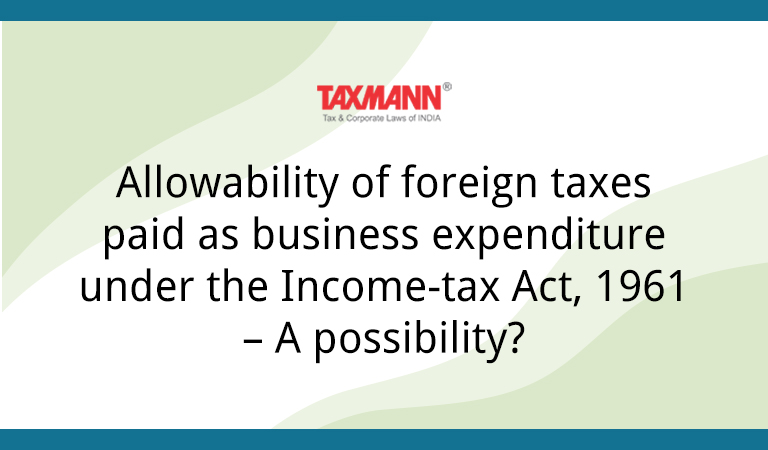Allowability of foreign taxes paid as business expenditure under the Income-tax Act, 1961 – A possibility?
- Blog|News|Income Tax|
- 1 minute
- By Taxmann
- |
- Last Updated on 2 December, 2021

Sudeep Das & Ashwath Pai – [2021] 132 taxmann.com 236 (Article)
The Indian economy, for a considerable period, has been a captivating investment destination for various multinational corporations. The Government is trying to consolidate India’s position as a favourable investment destination with reforms such as corporate tax rate cuts, improvements in the rank of ease of doing business, and strengthening insolvency provisions.
On the flipside, various surveys indicate the list of Indian companies investing abroad is on a rise considering the benefits accruing from global investing. As per Reserve Bank of India (RBI) data1, during June 2021, India Inc.’s overseas direct investments stood at a whopping US$ 2.8 billion, registering a 2x YoY growth. Out of the total investments, loans accounted for US$ 1.21 billion, equity capital accounted for US$ 426.84 million and issuance of guarantees stood at US$ 1.17 billion. Majority of the investments is attributable to information technology and manufacturing sector. Investing abroad has its own challenges from regulatory standpoint. From tax standpoint, non-allowability of taxes paid abroad as a credit in India remains a critical issue to be considered.
Therefore, during this period, it is important to understand the Indian income-tax implications on the foreign taxes paid by an Indian entity. This article attempts to discuss certain instances when foreign taxes paid are not eligible as credit against Indian taxes, and whether a possible alternative is available to the taxpayer.
Click Here To Read The Full Article
Disclaimer: The content/information published on the website is only for general information of the user and shall not be construed as legal advice. While the Taxmann has exercised reasonable efforts to ensure the veracity of information/content published, Taxmann shall be under no liability in any manner whatsoever for incorrect information, if any.

Taxmann Publications has a dedicated in-house Research & Editorial Team. This team consists of a team of Chartered Accountants, Company Secretaries, and Lawyers. This team works under the guidance and supervision of editor-in-chief Mr Rakesh Bhargava.
The Research and Editorial Team is responsible for developing reliable and accurate content for the readers. The team follows the six-sigma approach to achieve the benchmark of zero error in its publications and research platforms. The team ensures that the following publication guidelines are thoroughly followed while developing the content:
- The statutory material is obtained only from the authorized and reliable sources
- All the latest developments in the judicial and legislative fields are covered
- Prepare the analytical write-ups on current, controversial, and important issues to help the readers to understand the concept and its implications
- Every content published by Taxmann is complete, accurate and lucid
- All evidence-based statements are supported with proper reference to Section, Circular No., Notification No. or citations
- The golden rules of grammar, style and consistency are thoroughly followed
- Font and size that’s easy to read and remain consistent across all imprint and digital publications are applied



 CA | CS | CMA
CA | CS | CMA
